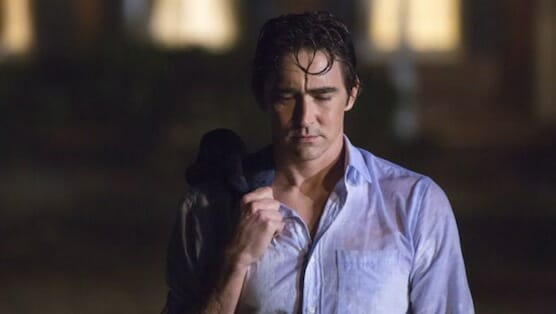
“Landfall” marks a substantial pivot in Halt and Catch Fire‘s narrative as an aspiring prestige cable drama. The show came out of the gate with a promising (if problematic) pilot. Subsequent installments saw some good development but not without other, infuriating story decisions that prevented audiences from engaging in a meaningful way. At a certain point the show begin to seem like it was less of a cable drama and more like someone’s idea for what they think a cable drama should be.
“Landfall” is different. For one, it’s just a good, well-written, well-directed episode of TV. Granted, it’s not enough to make me jump up in joy and forget all that preceded it, but—in terms of correcting the course—it’s a momentous step.
The set-up is far from revolutionary: a torrential storm hits the area, serving as an effective parallel to the turmoil occurring in each of our characters’ interior lives. Yet, what the episode lacks in subtlety it makes up for with stunning visuals and a handful of effective character moments.
After a successful demonstration of the Cardiff PC, the central conflict of the first part of the episode involves a dispute between Gordon and Cameron. Cameron has thought up a way for users to interact and communicate with their PC, giving it a “soul” of sorts. When she brings her idea to Gordon, he swiftly rebukes it. Such a tweak would require a reimagining of the operating system that he’s spent many sleepless nights toiling over. With Joe being relatively passive about the issue (he thinks Cameron’s idea is maybe worth considering, but doesn’t exactly approve it), the two commence a push-pull with the rest of the staff. Cameron tells them to work on expanding the OS capabilities, while Gordon instructs them not to do anything without his permission. At one point, in a fit of frustrated anger, Gordon lets it slip that Cameron is hooking up with Joe on the side.
Gordon’s problems at the office are exacerbated by problems at home. After offering to lighten his wife’s errand load by buying their daughter a Cabbage Patch doll, he completely forgets this task in the wake of the office drama and ends up having to drive around in the ensuing storm looking for a toy store that carries the doll. Meanwhile, Joe arrives at the Clark house for dinner and ends up showing a different, softer side of himself in front of Gordon and Donna’s children.
Like last week, the first thing you notice about the episode is the immense work that goes into the Halt and Catch Fire’s look. In this case, filming a rainstorm that’s both convincing and visually appealing is no easy task, but director Larysa Kondracki and director of photography Nelson Cragg craft a series of phenomenal shots that capture the scope and dread that accompanies such a force of nature. From Joe performing a dance with flashlights on the Clark’s front lawn to Gordon waddling through rainfall to see a dead man lying in the middle of the street—a victim of a fallen transformer— the images are both aesthetically beautiful and emotionally resonant.
Beyond visuals, the writing helps pinpoint what should be the show’s main appeal. In one of the key scenes of “Landfall,” Cameron has a discussion with Cardiff boss John Bosworth. Rather than talking down to her, like many of the company men tend to do, Bosworth actually engages with her on a personal level. Many at the company want her to fail, he explains, because she represents the future, and the future is a scary prospect. It’s this exchange that helps highlight the advantages of setting a drama in the tech world. More so than most businesses, tech is a constantly shifting and evolving organism; what’s trendy and successful one day is old news the next. As such, everyone is in a mad rush to stay ahead of the curve, and, in doing so, can treat his or her colleagues poorly in the pursuit of relevance. Such drama is what forms the foundation of the show and, particularly with the ideological conflict between Gordon and Cameron, “Landfall” really illustrates this struggle in a very affecting manner. You see where both sides are coming from and why they would fight to the death to convince people of their perspective.
More notably, “Landfall” goes a long way to humanize Joe after half-a-season of ill-conceived characterizations. That’s not to say he’s completely redeemed. Certainly, after torturing Cameron for the sake of publicity back in “Close to the Metal,” it’ll take more than one hour to get rid of the bad taste left by that manipulative step. Nevertheless, “Landfall” makes him seem less like a woefully misconceived cable antihero. In a bit that almost works as meta-commentary, the episode even begins with Cameron admonishing Joe for his unlikable tendencies. “Your whole ‘thing’… it attracts people, but it won’t keep them around,” she says, as if stealing the words out of many a critic’s mouth. By the end of the episode, we not only learn that Joe is capable of being an empathetic human being (via his interaction with Donna and the Clark kids), but we also are finally given the story behind his torso scars. Apparently, Joe’s mother was an unstable drug addict who ended up conducting an experiment that resulted in Joe falling off a three-story building and landing on a fence. It’s not the most surprising of developments, but Lee Pace’s performance goes a long way to sell the moment and Joe’s newfound openness.
“Landfall” marks a new highpoint and (one can hope) a new direction for the series. There’s certainly always the chance that the show will revert to its bad behavior come next week, but it’s hard to watch “Landfall” and not get the feeling that more assured hands are now guiding the narrative.
Mark Rozeman is a Los Angeles-based freelance writer and regular contributor to Paste. You can follow him on “Twitter”: https://twitter.com/Mrozema.